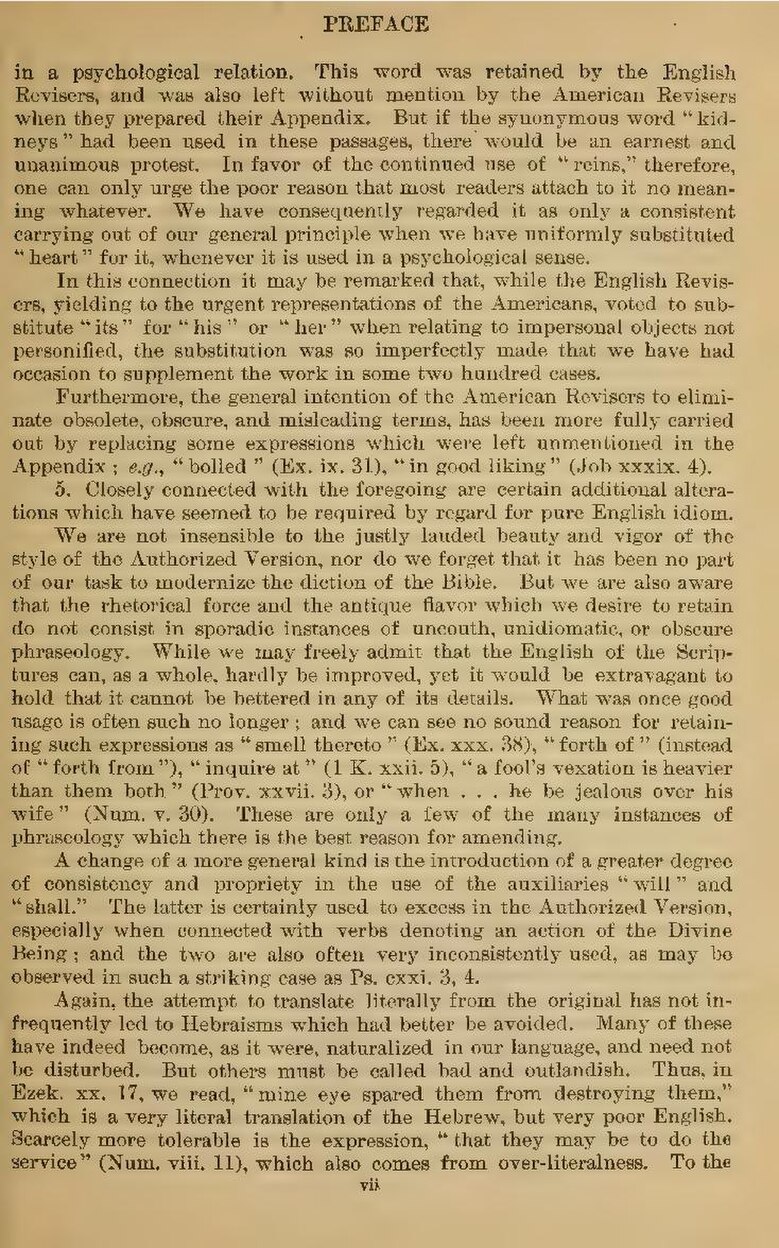in a psychological relation. This word was retained by the English Revisers, and was also left without mention by the American Revisers when they prepared their Appendix. But if the synonymous word "kidneys" had been used in these passages, there would be an earnest and unanimous protest. In favor of the continued use of "reins," therefore, one can only urge the poor reason that most readers attach to it no meaning whatever. We have consequently regarded it as only a consistent carrying out of our general principle when we have uniformly substituted "heart" for it, whenever it is used in a psychological sense.
In this connection it may be remarked that, while the English Revisers, yielding to the urgent representations of the Americans, voted to substitute "its" for "his" or "her" when relating to impersonal objects not personified, the substitution was so imperfectly made that we have had occasion to supplement the work in some two hundred cases.
Furthermore, the general intention of the American Revisers to eliminate obsolete, obscure, and misleading terms, has been more fully carried out by replacing some expressions which were left unmentioned in the Appendix; e.g., "bolled" (Ex. ix. 31), "in good liking" (Job xxxix. 4).
5. Closely connected with the foregoing are certain additional alterations which have seemed to be required by regard for pure English idiom.
We are not insensible to the justly lauded beauty and vigor of the style of the Authorized Version, nor do we forget that it has been no part of our task to modernize the diction of the Bible. But we are also aware that the rhetorical force and the antique flavor which we desire to retain do not consist in sporadic instances of uncouth, unidiomatic, or obscure phraseology. While we may freely admit that the English of the Scriptures can, as a whole, hardly be improved, yet it would be extravagant to hold that it cannot be bettered in any of its details. What was once good usage is often such no longer; and we can see no sound reason for retaining such expressions as "smell thereto" (Ex. xxx. 38), "forth of" (instead of "forth from"), "inquire at" (1 K. xxii. 5), "a fool's vexation is heavier than them both" (Prov. xxvii. 3), or "when . . . he be jealous over his wife" (Num. v. 30). These are only a few of the many instances of phraseology which there is the best reason for amending.
A change of a more general kind is the introduction of a greater degree of consistency and propriety in the use of the auxiliaries "will" and "shall." The latter is certainly used to excess in the Authorized Version, especially when connected with verbs denoting an action of the Divine Being; and the two are also often very inconsistently used, as may be observed in such a striking case as Ps. cxxi. 3, 4.
Again, the attempt to translate literally from the original has not infrequently led to Hebraisms which had better be avoided. Many of these have indeed become, as it were, naturalized in our language, and need not be disturbed. But others must be called bad and outlandish. Thus, in Ezek. xx. 17, we read, "mine eye spared them from destroying them," which is a very literal translation of the Hebrew, but very poor English. Scarcely more tolerable is the expression, "that they may be to do the service" (Num. viii. 11), which also comes from over-literalness. To the
